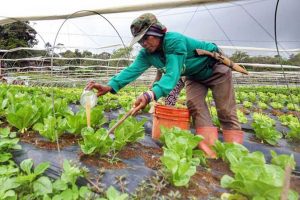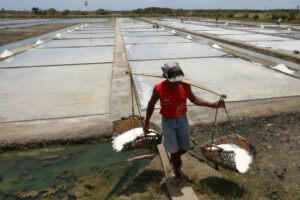Direct-sale model comes for middlemen in produce trade

By Patricia B. Mirasol, Reporter
MARKET forces are a cruel master, forcing economic actors to be efficient enough to thrive even when prices are low. Sometimes, however, they fall too low for most producers to earn a decent living. And that is where organizations like Rural Rising Philippines (RuRi) step in.
RuRi, a self-described “accidental advocacy,” has dedicated itself to the proposition that farm produce is unfairly priced, and that direct purchasing at higher prices and a distribution model light on middlemen might hold the key to a future where everyone in the supply chain benefits.
The husband-and-wife team that runs RuRi intended to give farmers enough leverage “to stand up to middlemen,” according to co-founder Ace C. Estrada. “Now they say, ‘Oh, Rural Rising pays us this much.’”
Mr. Estrada and wife Andie sell the produce they pick up at higher-than-market prices via a 38,000-member Facebook group, and to 174,000 followers on the RuRi Facebook page.
The enterprise was inspired by news stories during the height of the lockdown in 2020 about farmers forced to throw their produce away because of a lack of buyers.
RuRi supporters “are entranced by the stories of the farmers,” Mr. Estrada said in an e-mail. “We reveal the names of people and places where we get (the produce). This transparency inspires members to help more, because they are now not just buying vegetables but… (also) buying the opportunity to help.”
The social enterprise purchases produce from farmers from Luzon and parts of the Visayas, including Leyte and Antique.
A farmer from Zambales, for instance, attested to the sale of three tons of sweet potatoes to RuRi for P35 per kilo. Middlemen would have paid P9 per kilo, the farmer told Mr. Estrada.
The inefficiency of transport in rural areas and the fragmented nature of small farms means middlemen have stepped in to consolidate the harvests and transport them to markets. The cut they take at each stage means that squash that sells for P4 at the farmgate will be priced at P50 by the time it reaches a public market in Metro Manila.
Middlemen are “not necessarily evil,” Mr. Estrada said. “But there should be price regulation.”
TULFO NG AGRI
For his efforts, Mr. Estrada has been called the “Tulfo ng Agri,” a reference to Senator Rafael T. Tulfo’s public affairs show that aids people victimized by fraud and exploitation.
The problem of the farmers is also an inability to see opportunity in large harvests, he told BusinessWorld.
“We tell them to be entrepreneurial,” he said. “They come to us ‘pag nagtatapon na sila (when they are about to dispose of produce). It’s always, ‘Sir, nagtapon po kami ng (we discarded) four tons.’ It’s never, ‘We are about to harvest in two weeks.’”
One of the latest purchases is from an Aglipay, Quirino province farmer who was able to bring his ripening Japanese sweet potatoes (bintong) to RuRi’s truck in Nueva Vizcaya — right before it had to travel back to Manila.
Prior to RuRi, Mr. Estrada ran a coding bootcamp in Baguio. The IT worldview of dealing with constant disruption gave him a taste for disrupting agriculture, which he considers riddled with “vested interests.”
“Ano ’yung product na political, or laging pinag-uusapan sa Senado (What product is political and always being discussed in the Senate)?” he asked. “May (There are) vested interests to protect.”
“Some products are more dangerous to handle than others, so we stay away from that,” he said, adding that he has received threats as a result of his work.
Future plans include the opening of stores akin to mini-versions of a Food Terminal, Inc., a center for receiving produce from the hinterlands to systematize urban food distribution.
The founders also aim to develop RuRi as a corporation, and make group members and farmers part owners.
Making farmers shareholders will give them another source of income apart from farming, Mr. Estrada said.
“Members can buy shares for a farmer and donate it to him, to inspire him to continue to contribute — both as a producer and an owner,” he added.




